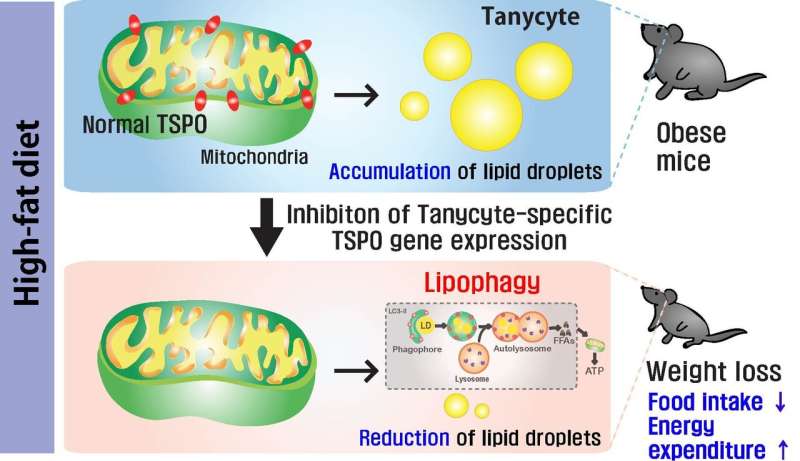Discovery of tanycytic TSPO inhibition as a potential therapeutic target for obesity treatment

Professor Eun-Kyoung Kim (director of Neurometabolomic Research Center) has discovered new targets to prevent and treat high-fat diet-induced obesity. This research achievement is expected to propose a new direction for developing obesity treatment.
Due to westernized eating habits in today's society, the prevalence of metabolic diseases such as obesity and diabetes has markedly increased. To prevent and treat these diseases, it is important to decrease appetite and increase energy consumption. However, specific mechanisms for effective treatment of metabolic disease has not been elucidated yet.
Based on the knowledge that tanycytes, which connects the cerebral ventricle and the hypothalamus, detect nutrients in food and control appetite, Dr. Eun-Kyoung Kim's research team found that translocator protein (TSPO), a mitochondrial protein in the tanycytes, responds to the overnutrition signal and controls lipid and energy metabolism. The research team also found that TSPO inhibition increases energy expenditure in the body and decreases appetite.
The research team observed that excessive lipid droplets, the major cellular organelles for the storage of neutral lipids, are accumulated in tanycytes of high-fat diet-induced obese mice. In those mice, inhibition of tanycytic TSPO induced lipophagy, one type of autophagy, breaking down lipid droplets to use them as an energy source via modulating energy homeostasis. As a result, the production of adenosine triphosphate (ATP), which plays essential roles in cellular energy metabolism, was increased. Furthermore, food intake was reduced and energy expenditure was elevated, leading to weight loss when tanycytic TSPO was inhibited in high-fat diet-induced obese mice.
Dr. Kim said that clarifying the role of tanycytic TSPO controlling lipophagy helps to understand the functions of these cells in an overnutrition state. The findings suggest the possibility to use tanycytic TSPO as a therapeutic strategy for metabolic diseases such as obesity.
More information: Seolsong Kim et al. Tanycytic TSPO inhibition induces lipophagy to regulate lipid metabolism and improve energy balance, Autophagy (2019). DOI: 10.1080/15548627.2019.1659616




















